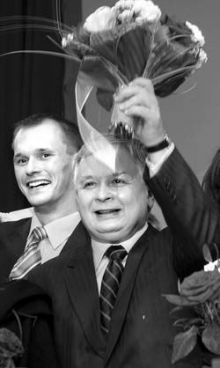The inauguration of the new Polish president on Dec. 24 ended the long “Kwasniewski era.” A new period has begun in Polish history. The left-leaning Alexander Kwasniewski has been replaced by Lech Kaczynski, a liberal nationalist, who fears deep European integration and believes in the need to preserve Catholic values in Polish society.
The 56-year-old Kaczynski intends to combat political corruption, clean out former communists from government institutions, and provide social guarantees to underprivileged social groups. Although under the Polish Constitution the prime minister has broader powers than the president, Kaczynski still has the right to initiate legislation, veto bills, and command the armed forces.
Will Poland’s foreign policy change? Obviously, one cannot expect President Kaczynski to transform it in a fundamental way. It is even more doubtful that relations between Kyiv and Warsaw will be affected. However, individual directions in Poland’s international policy may change now that a former member of “Solidarity” is occupying the presidential office.
Kaczynski’s past record and work indicate a positive attitude to Ukrainians. In his campaign speeches Kaczynski stressed that relations with Ukraine must be stable and develop intensively. We can therefore hope that our cooperation with Poland will become even closer during his tenure. President Kaczynski represents the Polish realistic elite whose representatives are very well aware that Poland is of secondary importance to Germany or France, whereas together with Ukraine it can compete in European markets. “For Poland, Ukraine is a breath of fresh air. There are 48 million Ukrainians and 40 million Poles. Who in Europe has a greater potential? Together we are 88 million,” said the new president.
Notably, Poland’s new leader plans to make his first official visits to the US, the Vatican, and Ukraine. This is unquestionably a positive signal of closer relations between Poles and Ukrainians. However, there are other, less pleasant, messages. According to a recent opinion poll held in Poland on Nov. 11-14, 2005, 70 percent of respondents said they dislike Arabs. The other national and ethic groups least favored by Poles are gypsies (65 percent), Russians (61 percent), Turks (53 percent), and Ukrainians (50 percent).
These results lead one to conclude that as a geostrategic partner Ukraine owes its significance mostly to the Polish elite and not the majority of the Polish population. It is out of this situation that President Kaczynski will start to strengthen the strategic Ukraine- Poland team. Regardless of past historical conflicts, which unfortunately still shape Poles’ negative concept of Ukrainians, it may be a problem maintaining a stable partnership with a country in which half of the population has a negative view of its strategic partner. Obviously, not everyone in Ukraine, and especially in the western oblasts, can declare a positive attitude toward Poles. But there is no doubt that this indicator of aversion will never come close to the Poles’ 50 percent. Thus, one of the priorities in Ukrainian-Polish relations should be for our societies to cast aside past offenses, which are still preventing ordinary Poles from realizing the significance of joint Polish-Ukrainian efforts in the international arena.
At the same time, President Kaczynski will have to ensure that the construction of the Odesa- Brody oil pipeline, strategically important for the two countries, continues on Polish territory. The current standoff between Russia and Ukraine over natural gas is proof that the Poles and Ukrainians must urgently look for alternative energy sources. Notably, on the eve of President Kaczynski’s inauguration relations with Russia once again became the focus of media attention in Poland. Ex-president Kwasniewski, whom the Kaczynski brothers repeatedly criticized for Poland’s excessively soft foreign policy toward Russia, publicly cautioned the future head of state against taking any harsh steps against the Russian Federation. As he put it, mutual accusations will lead to no good. Kwasniewski recommended that Kaczynski meet with the Russian leadership not in Poland or Russia but on neutral territory. Perhaps if an agreement on such a meeting is reached, President Kaczynski might suggest to his Russian counterpart that they meet in Ukraine, even though Vladimir Putin would obviously be more comfortable moving the meeting to Germany.
The new Polish president will face another “historic mission” connected with resolving outstanding problems from the not so distant communist past. The start of Kaczynski’s presidency will coincide with the end of the trial of Poland’s former president General Wojciech Jaruzelski. This is basically a trial of Poland’s communist past. Poles are now debating whether Jaruzelski violated the constitution by imposing marshal law in 1981. Jaruzelski, now 82, may also face charges of persecuting and imprisoning thousands of opponents of the communist regime. Before his inauguration, Kaczynski visited a mine in southern Poland, where on Dec. 16, 1981, nine coal miners were killed while protesting the imposition of marshal law. “We will never forget this crime,” the president wrote in the visitors’ book, afterwards laying flowers at a monument to the murdered miners.
Poland is expecting changes, not revolutionary changes but radical ones, the new president stressed. In terms of its foreign policies Poland will now obviously try to combine the need to further integrate into the EU and the desire of the Polish nation to become a great and influential country. In certain respects Ukraine and Poland are important partners and equals. At least the two sides speak less of advocacy. This may be because in this relationship Ukraine also acted as an advocate when it tried to make peace between Poland and Belarus.







